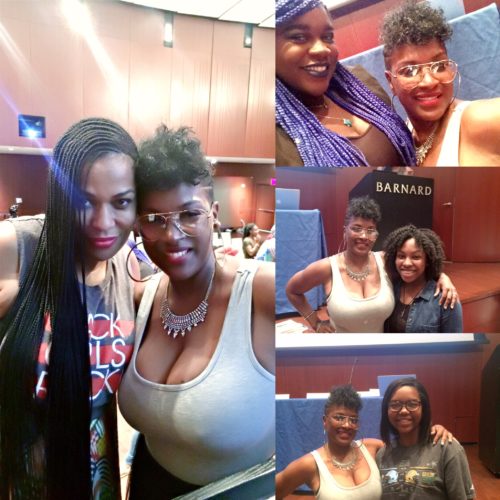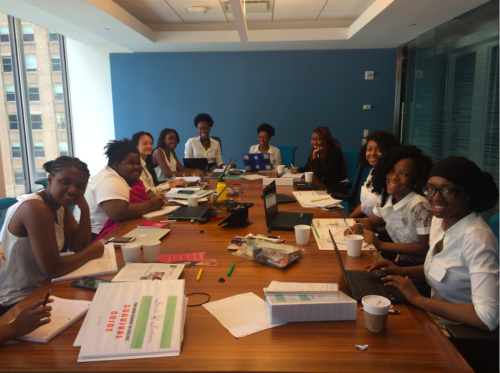
I’ve dropped some serious coin on writing workshops with schools like the Frederick Douglass Creative Arts Center in Harlem (RIP), Gotham, Mediabistro and The Best Sellers Publishing Course. The last one was more about publishing than writing, but that’s for a later post. It’s safe to say I’ve seen my share of writing communities from investing in my craft.
For those of you about to break your writing workshop cherry, let me offer some insight, as someone’s who has been a student and a teacher. See the photo here with some happy young writers at the Black Girls Rock! conference.
THERE’S LEVELS TO THIS
For the sake of this post, let’s agree that you’re in a short story writing workshop. The word count for shorts vary from 1,000 to 7000 words; flash fiction is around 500 words; micro-fiction is 300 words or less. (See there’s something for everybody.)
Choose a workshop where everyone is on the same level, meaning let the newbies join Red Riding Hood and find their way together to grandma’s house, while the advanced folks wax poetic about why their shorts must be told in verse.
There’s nothing wrong with staying in your lane on this one, i.e. beginner, intermediate or advanced. Why?
Because: intimidation.
This isn’t school. Back then the teacher read your “The Night My Goldfish Died,” story and assaulted your grammar in red pen and your classmates were none the wiser. In workshops, everyone reads everyone’s crappy first attempt. It’s easier to swallow critiques for “The Affair My Best Friend’s Husband” without someone on the level of Junot Díaz or Amy Tan sitting next to you.
CRITICISM SUCKS OR NAH?
A word about criticism…
The purpose of a critique is to evaluate the work to increase the reader’s understanding. Note: Most instructors offer a guide or explain in great detail how to deliver thoughtful commentary, because we all know that opinions are like booty holes, everybody got one.
Now isn’t the time to get in your feels. Thoughtful analysis is designed to improve your story about discovering a ghost in you TiTi’s coat closet. You want the best story. You know what it feels like to close a book or finish a short story and feel dissatisfied with the final product.

WRITERS ARE SUPERHEROES
If you don’t have thick ass alligator skin before the course, then you’ll become a reluctant member of the reptile family after surviving multiple weeks of critiques from your instructor and classmates. If you don’t, shame on you.
Being a writer isn’t for normal folks. We’re superheroes.
Once you earn your red thigh high boots and golden lasso, you’ll accept meaningful critiques that can help you see blind spots in your work. And you may develop an appreciation for genres beyond your comfort zone. If you’ve never read dystopian fiction (à la Scott Westerfield’s Uglies) and a classmate is workshopping that model, you’ll be forced to pay attention and understand the moving parts of this ethos.
It’s only fair, right? I mean, she did suffer through the ghost thing.
LASER FOCUS FOR THE WIN
There’s nothing like a financial investment of $300 or more on a course to inspire laser focus. And unlike college, there isn’t a frat party or sheepskin diploma waiting for you once the eight weeks are completed. If the goal is to have a piece ready for Word Riot (for flash fiction fans), Glimmer Train (for literary types) or Lightspeed (for sci-fi folks), then commit to killing it outside of the workshop.
That means sit down and write, build those dystopian worlds and explain the behavior of those ghosts, because if you can’t write about it clearly and don’t understand it, the folks in the workshop won’t get it either, which WILL make you frustrated, angry, hurt and in your feels.
It’s like that New Year’s lie resolution everyone made in December to be fit for 2017. Those abs don’t crunch on themselves. If they did, I’d STILL have a six pack. You gotta hit the gym and go hard. The same concept applies here.
If the first seven weeks are devoted to cranking out a messy draft, and the last three are for revising, cancel Christmas, skip happy hour and postpone a Tinder hookup to make that keyboard dance. Revising is a writer’s best friend, but it’ll make you question why you wrote 500 words about a dog kennel in a story about friendly ghosts; and all of your favorite sentences will end up on the cutting room floor.
Writers call it “killing your darlings” (or “killing your babies,” depending on which writer you’re talking to) because we can’t afford to fall in love with any part of the story that doesn’t make it better.
All of that extra crap has to go to make your story better and that’s non-negotiable for superheroes.
What was the biggest surprise you experienced from taking a writing workshop?
